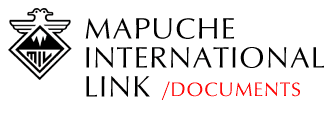
 |
|
|
| Home
| Front Page
| News
| Documents |
Environmental
| Archive
| Discussion
Point Links | About Us |
Statement given by Miss Andrea Marifil to the Human Rights Council Human Rights Council Item 9. Racism, racial discrimination, xenophobia and related forms of intolerance, follow-up to and application of the Durban Declaration and Programme of Action (Statement made on behalf of the South America Indian Council) Thank you Mr. President, In Chile a new law is being systematically applied that violates the Human, Civil and Political Rights of the Mapuche people. In November 2008 Law 19.970 was promulgated, which created the National DNA Registration System. This law is intended to obtain “particular genetic fingerprints at the time of a criminal investigation”. This law is being applied in an arbitrary and indiscriminate way to all Mapuche political prisoners. Those who object to this are prosecuted, thus adding another offence to those of which they are accused, thereby prolonging their imprisonment. Mapuches see this new legislation as a further instrument of harassment and political persecution. In effect, all the Mapuche leaders who are imprisoned have been notified that their genetic fingerprints are to be extracted. This practice includes those Mapuches who have already completed their sentences and are free today, as happened to former political prisoner Julio Marileo, who on 5 February 2009 had to ‘’seek an injunction’’ (recurso de protección), a remedy to protect his constitutional rights, before the Court of Appeal in Temuco. On 21 January 2009 Lonko Juana Calfunao, a well-known Mapuche authority, who has been in prison since November 2006 accused of “public disorder” offences and ‘attacking a public prosecuter’ (atentado a la autoridad) she was summoned to appear at the prison infirmary to have genetic samples taken. Only her strong, determined refusal prevented this from taking place, even though this meant a series of punitive and disciplinary measures against her that could well be defined as psychological torture. On 24 February of this year the Mapuche Chief, who is already serving ridiculously exaggerated prison terms, had to undergo new legal proceedings before the Oral Criminal Court of Temuco. This new Law supplements the repressive laws introduced during Pinochet's regime, such as the Internal Security Law and the Anti-terrorist Law, which are today applied against Mapuche leaders. The application of these laws against those Mapuches who are fighting for their rights has been condemned by all human rights organisations. Strong international pressure forced Chilean President Michelle Bachelet to make an announcement last year and to openly declare that she would not apply the Anti-terrorist Law against Mapuche activists. Nevertheless, this undertaking was reversed on 15 February of this year when the law was used against Mapuche activist Miguel Tapia Huenulaf. The accusations against him have been flatly denied by Mr Huenulaf and his family, who have condemned it as a police set-up. In Chile, Cultural Rights are not respected; for example, the men’s custom of wearing their hair long is considered by many Mapuches as an important part of their cultural identity. Carlos Cayupe Aillapan, a Mapuche political prisoner aged 43, has been confined since mid-September 2008 in Victoria prison. In January of this year, Cayupe was forced to cut his hair by order of the Judge of the Oral Criminal Court of Victoria, María Olga Moreno, as well as continually being harassed by the prison staff for wearing his traditional dress. Finally, Mr. President, the Chilean Senate is discussing a “Constitutional Reform Bill”, which is supposedly to recognise the existence of the indigenous peoples. Yet this bill has been drafted without the participation of the peoples concerned nor prior, free and informed consultation with them. Furthermore, the Chilean state does not recognise the Mapuche nation as such, with its inherent rights, and the international treaties entered into with Spain and the Republic of Chile - in which Mapuche sovereignty over its ancestral territory and resources is recognised - are ignored. Our Mapuche people reserve the right to combat this colonialist legislation and will continue to develop its own entities in accordance with its common law, in order to strengthen its autonomy, free self-determination and self-government, rights that are recognised by international norms. Thank you Mr. President.
____________________ Translated by Leslie Ray
|
| |
||
|
||